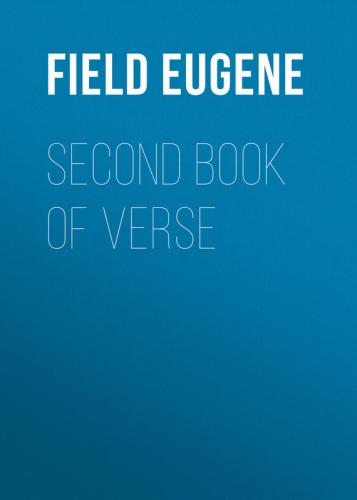The scene of mirth galore:
'Tis now a lonely, musty shell,
Deserted, like to fall;
And Echo mocks their ghostly knocks,
And iterates their call.
Come back, thou ghost of ruddy host,
From Pluto's misty shore;
Renew to-night the keen delight
Of by-gone years once more;
Brew for this merry, motley horde,
And serve the steaming cheer;
And grant that I may lurk hard by,
To see the mirth, and hear.
Ah, me! I dream what things may seem
To others childish vain,
And yet at night 'tis my delight
To walk St. Martin's Lane;
For, in the light of other days,
I walk with those I love,
And all the time St. Martin's chime
Makes piteous moan above.
THE SINGING IN GOD'S ACRE
OUT yonder in the moonlight, wherein God's Acre lies,
Go angels walking to and fro, singing their lullabies.
Their radiant wings are folded, and their eyes are bended low,
As they sing among the beds whereon the flowers delight to grow, —
"Sleep, oh, sleep!
The Shepherd guardeth His sheep.
Fast speedeth the night away,
Soon cometh the glorious day;
Sleep, weary ones, while ye may, —
Sleep, oh, sleep!"
The flowers within God's Acre see that fair and wondrous sight,
And hear the angels singing to the sleepers through the night;
And, lo! throughout the hours of day those gentle flowers prolong
The music of the angels in that tender slumber-song, —
"Sleep, oh, sleep!
The Shepherd loveth His sheep.
He that guardeth His flock the best
Hath folded them to His loving breast;
So sleep ye now, and take your rest, —
Sleep, oh, sleep!"
From angel and from flower the years have learned that soothing song,
And with its heavenly music speed the days and nights along;
So through all time, whose flight the Shepherd's vigils glorify,
God's Acre slumbereth in the grace of that sweet lullaby, —
"Sleep, oh, sleep!
The Shepherd loveth His sheep.
Fast speedeth the night away,
Soon cometh the glorious day;
Sleep, weary ones, while ye may, —
Sleep, oh, sleep!"
DEAR OLD LONDON
WHEN I was broke in London in the fall of '89,
I chanced to spy in Oxford Street this tantalizing sign, —
"A Splendid Horace cheap for Cash!" Of course I had to look
Upon the vaunted bargain, and it was a noble book!
A finer one I've never seen, nor can I hope to see, —
The first edition, richly bound, and clean as clean can be;
And, just to think, for three-pounds-ten I might have had that Pine,
When I was broke in London in the fall of '89!
Down at Noseda's, in the Strand, I found, one fateful day,
A portrait that I pined for as only maniac may, —
A print of Madame Vestris (she flourished years ago,
Was Bartolozzi's daughter and a thoroughbred, you know).
A clean and handsome print it was, and cheap at thirty bob, —
That's what I told the salesman, as I choked a rising sob;
But I hung around Noseda's as it were a holy shrine,
When I was broke in London in the fall of '89.
At Davey's, in Great Russell Street, were autographs galore,
And Mr. Davey used to let me con that precious store.
Sometimes I read what warriors wrote, sometimes a king's command,
But oftener still a poet's verse, writ in a meagre hand.
Lamb, Byron, Addison, and Burns, Pope, Johnson, Swift, and Scott, —
It needed but a paltry sum to comprehend the lot;
Yet, though Friend Davey marked 'em down, what could I but decline?
For I was broke in London in the fall of '89.
Of antique swords and spears I saw a vast and dazzling heap
That Curio Fenton offered me at prices passing cheap;
And, oh, the quaint old bureaus, and the warming-pans of brass,
And the lovely hideous freaks I found in pewter and in glass!
And, oh, the sideboards, candlesticks, the cracked old china plates,
The clocks and spoons from Amsterdam that antedate all dates!
Of such superb monstrosities I found an endless mine
When I was broke in London in the fall of '89.
O ye that hanker after boons that others idle by, —
The battered things that please the soul, though they may vex the eye, —
The silver plate and crockery all sanctified with grime,
The oaken stuff that has defied the tooth of envious Time,
The musty tomes, the speckled prints, the mildewed bills of play,
And other costly relics of malodorous decay, —
Ye only can appreciate what agony was mine
When I was broke in London in the fall of '89.
When, in the course of natural things, I go to my reward,
Let no imposing epitaph my martyrdoms record;
Neither in Hebrew, Latin, Greek, nor any classic tongue,
Let my ten thousand triumphs over human griefs be sung;
But in plain Anglo-Saxon – that he may know who seeks
What agonizing pangs I've had while on the hunt for freaks —
Let there be writ upon the slab that marks my grave this line:
"Deceased was broke in London in the fall of '89."
CORSICAN LULLABY
BAMBINO in his cradle slept;
And by his side his grandam grim
Bent down and smiled upon the child,
And sung this lullaby to him, —
This "ninna and anninia":
"When thou art older, thou shalt mind
To traverse countries far
